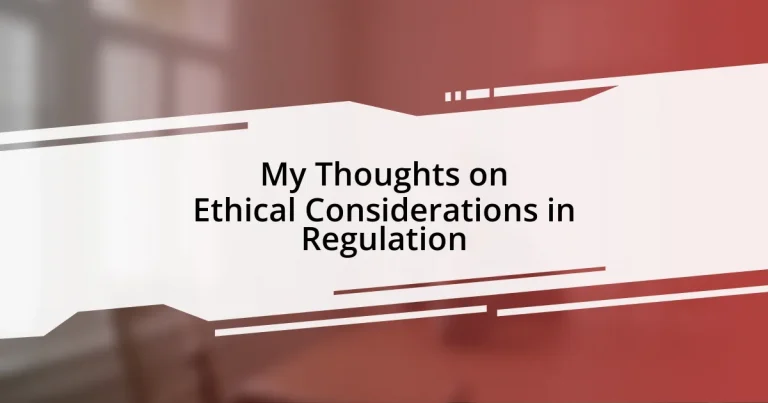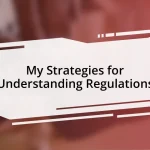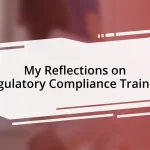Key takeaways:
- Ethical considerations are vital for building trust, transparency, and accountability in regulation, impacting public morale and compliance.
- Effective ethical decision-making frameworks involve stakeholder identification, impact assessment, reflection on values, and evaluation of outcomes.
- Common ethical issues in regulation include conflicts of interest, the balance between innovation and safety, and the need for inclusivity in regulatory processes.
- Future trends in ethical regulation may include technology-driven oversight, global collaboration on ethical standards, and heightened public accountability for organizational ethics.
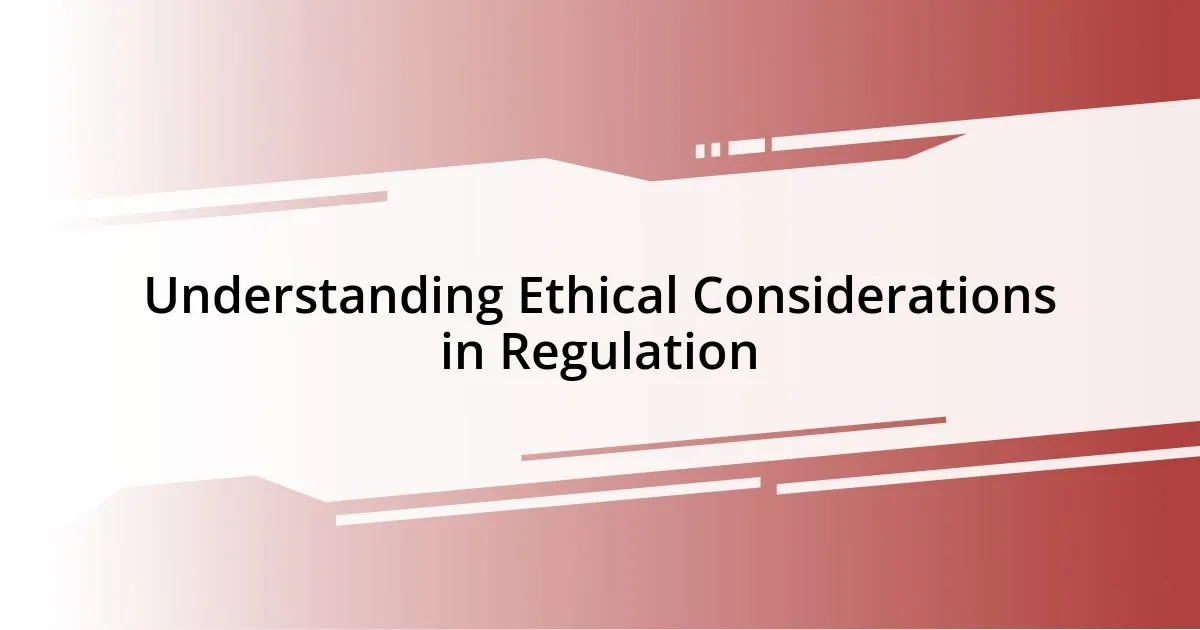
Understanding Ethical Considerations in Regulation
Ethical considerations in regulation are fundamental to ensuring fairness and accountability. I often reflect on a time when I witnessed a regulatory body make a decision that prioritized corporate interests over community welfare. How do we balance the scales when the lines of ethical responsibility become blurred?
When I think about the significance of ethics in regulation, I find myself drawn to the idea of trust. Trust forms the foundation of any regulatory framework. Without it, how can we expect the public to comply with rules designed to protect them? This connection between ethics and trust is crucial. I’ve seen firsthand how effective regulations built on ethical principles promote transparency, leading to healthier relationships between regulators and those they oversee.
As I delve deeper into ethical considerations, I can’t help but acknowledge the challenge they pose for regulators. They often face conflicting values, like efficiency versus fairness. Is it possible to achieve a balance where all parties feel heard and protected? In my experience, appreciating the nuanced perspectives of stakeholders can lead to more thoughtful regulation, which ultimately benefits everyone involved.
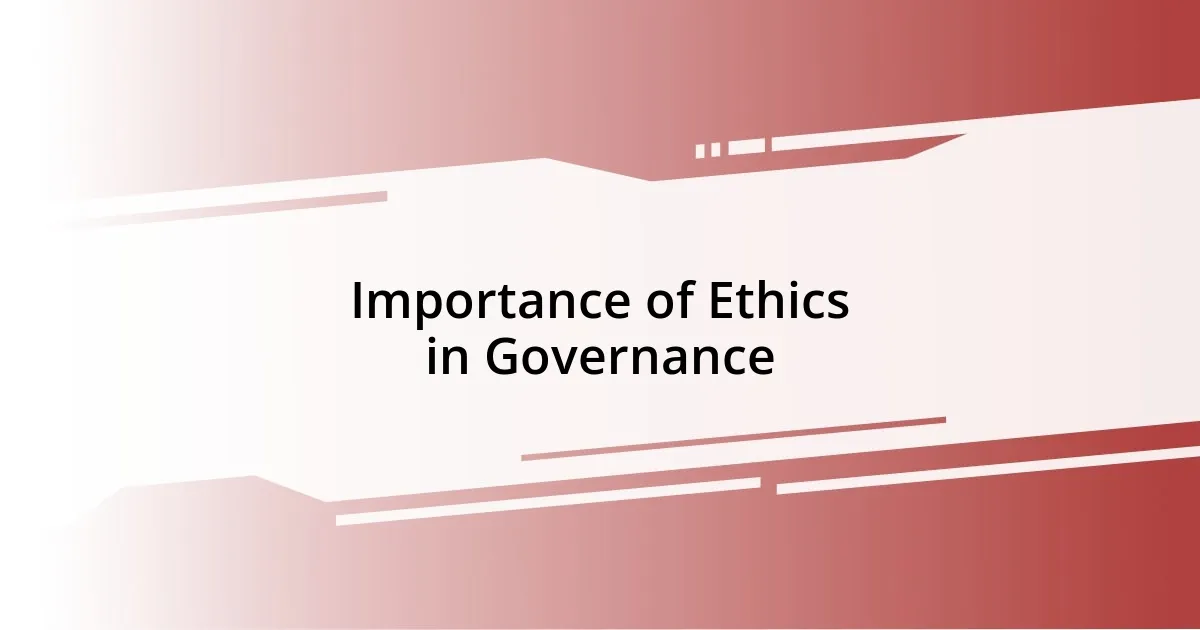
Importance of Ethics in Governance
The role of ethics in governance cannot be understated. I recall a project where local government officials attempted to enact new regulations without engaging community feedback. The fallout was palpable—distrust grew, and residents felt sidelined. It became clear to me that ethical governance fosters a culture of inclusion, where every voice matters, helping to bridge gaps between authorities and the people they serve.
Ethics guide decision-making processes, emphasizing fairness and justice. Here are some reasons why ethics is crucial in governance:
- Trust Building: Ethical practices create an environment where the public feels confident in their leaders.
- Accountability: When ethical standards are prioritized, officials are held responsible for their actions, leading to better outcomes.
- Transparency: Ethics encourage openness, which can deter corruption and promote fair play.
- Community Engagement: Ethical governance paves the way for community involvement, ensuring diverse perspectives are considered.
Reflecting on my experience, I’ve observed that when ethics are at the forefront, not only do regulations improve, but so does overall public morale.
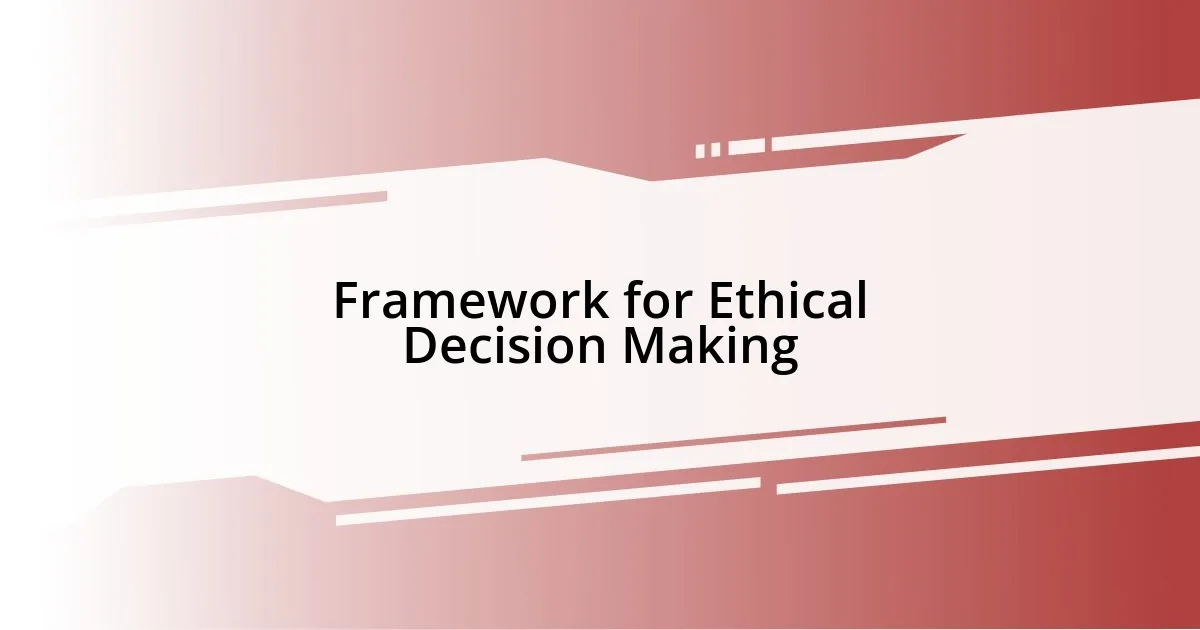
Framework for Ethical Decision Making
When I consider frameworks for ethical decision-making, I often envision a structured approach that can guide regulators through complex dilemmas. I had a moment in a workshop where we brainstormed a decision-making model. We emphasized identifying stakeholders, understanding their perspectives, and weighing the potential impact of decisions. It was a revelation; I realized how powerful a well-defined framework can be in navigating ethical waters.
Another key aspect of ethical decision-making is the role of reflection. I distinctly remember a difficult regulatory choice where we were torn between economic growth and environmental sustainability. The framework encouraged me to pause and reflect on our values. This time for introspection helped clarify that prioritizing community welfare should always win out in the long run.
In integration with principles like fairness, transparency, and accountability, an effective framework often includes an evaluation phase. I’ve learned that checking back on the decisions made and their outcomes is vital. Have they aligned with our ethical goals? This iterative process reinforces a culture of continuous improvement. It makes ethical considerations not just a one-off exercise but an ongoing commitment.
| Element | Description |
|---|---|
| Stakeholder Identification | Recognizing and understanding all parties impacted by the decision. |
| Impact Assessment | Evaluating potential repercussions for fairness and accountability. |
| Reflection | Taking time to consider personal and organizational values in decision-making. |
| Evaluation | Reviewing the outcomes of decisions to ensure they meet ethical standards. |
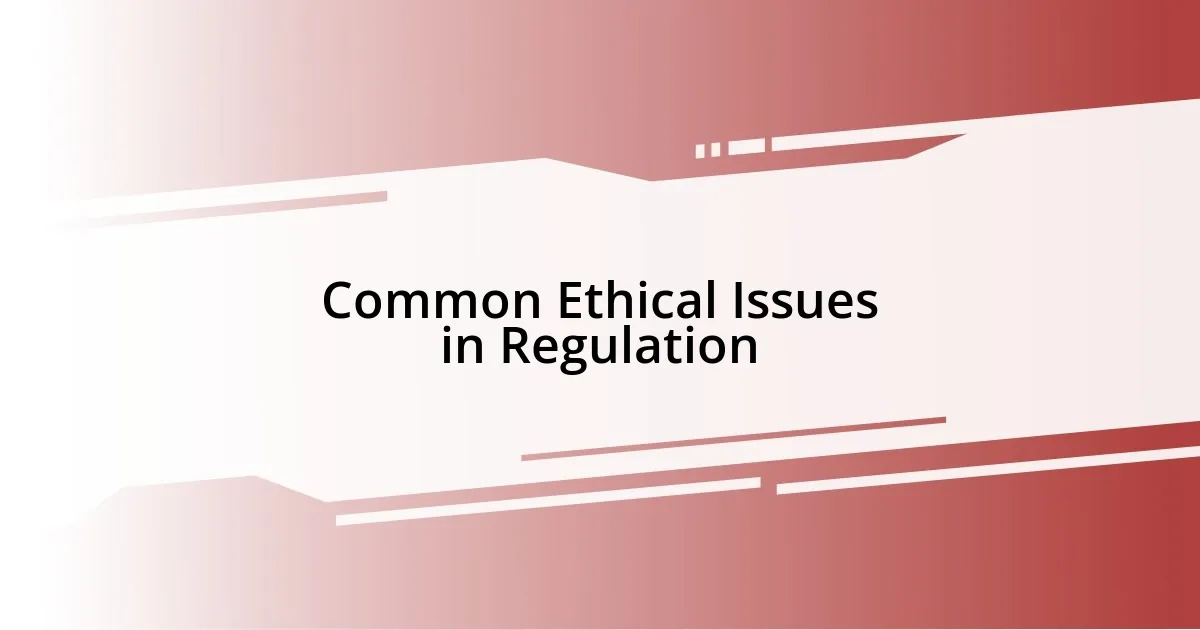
Common Ethical Issues in Regulation
One of the most pressing ethical issues I’ve encountered in regulation is the potential conflict of interest. I remember working alongside a regulatory body where some members had financial ties to companies they were supposed to oversee. It struck me as deeply troubling because it undermined public trust. How can we expect fair regulation when personal gains might overshadow the common good?
Another significant concern is the balance between innovation and safety. In my experience with technology regulation, I’ve seen advancements rushed to market, often sidelining safety protocols. This raises an important question: should we prioritize rapid progress even when it risks public safety? The fear that accompanies such decisions can be overwhelming; the ripple effects can impact lives.
Lastly, I often reflect on the issue of inclusivity in regulatory processes. I once participated in a regulatory advisory committee where certain community voices were dismissed, leading to policies that didn’t reflect the needs of those most affected. It made me wonder—how can regulation truly be effective if it excludes the very people it aims to serve? Engaging diverse perspectives isn’t just an ethical obligation; it’s essential for crafting regulations that resonate with and benefit everyone.
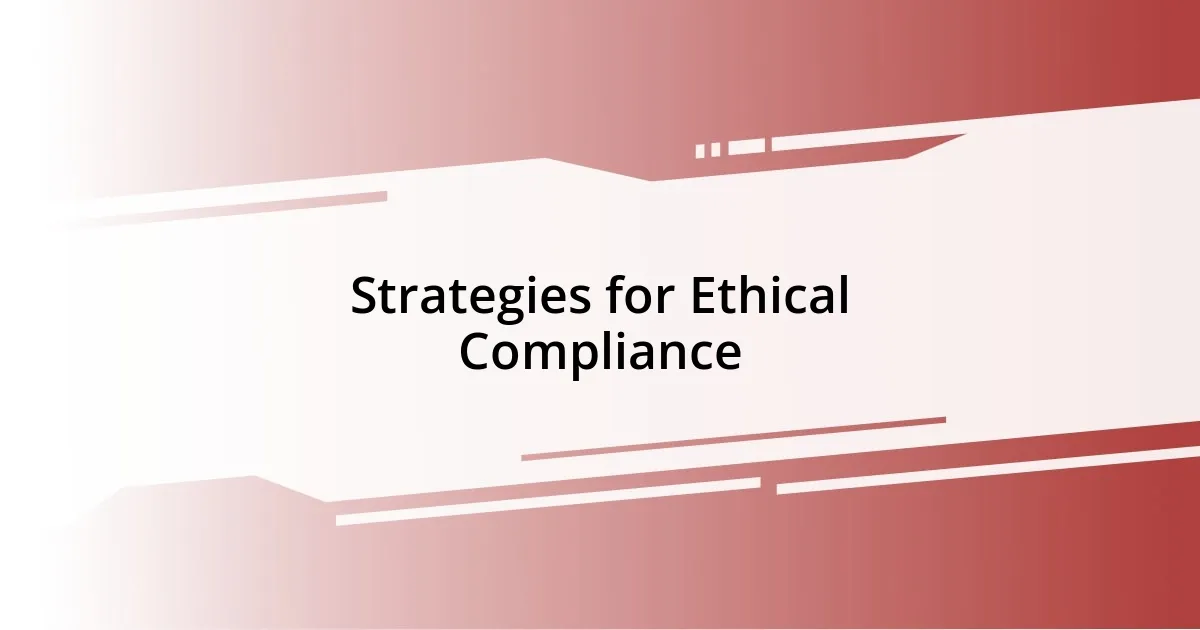
Strategies for Ethical Compliance
Fostering a culture of ethical compliance begins with open communication. I remember being part of a team brainstorming session where we encouraged members to voice their concerns freely. This transparency not only built trust but also empowered individuals to feel responsible for the ethical outcomes of their actions. It’s fascinating how creating an environment where everyone feels heard can lead to more thoughtful decision-making. How often do we overlook the power of a simple conversation?
Training and education are pivotal in reinforcing ethical standards. I once attended a workshop designed to enhance our understanding of ethical dilemmas specific to our industry. The real-life scenarios we navigated forced me to confront biases I didn’t recognize I had. It was eye-opening! Regular training sessions shouldn’t just be box-ticking exercises; they should engage participants in meaningful discussions that promote lasting values. What if every organization invested in continuous ethical education? The impact could be transformative.
Lastly, integrating ethics into performance evaluations strikes me as a powerful strategy. In past roles, I experienced firsthand the shift in culture when ethical behavior didn’t just meet vague expectations but was tied to promotions and rewards. It nudged everyone to align their actions with ethical standards seriously! It makes me wonder—could this approach not only reduce misconduct but also enhance overall job satisfaction? This alignment of personal and organizational values forms a solid foundation for ethical compliance.
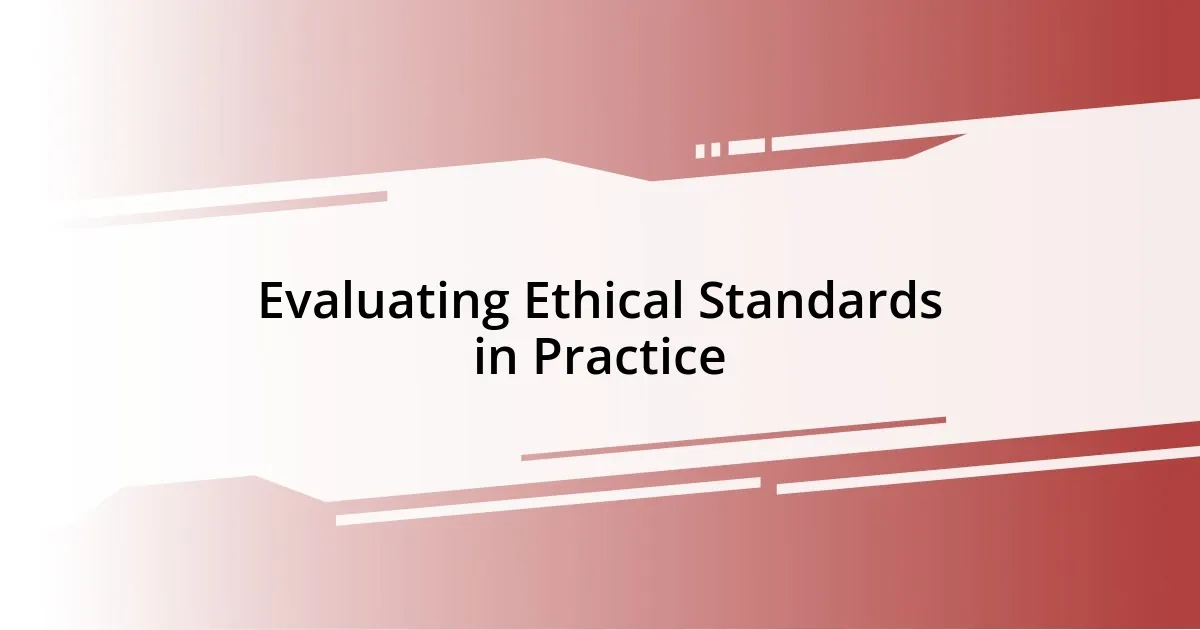
Evaluating Ethical Standards in Practice
When it comes to evaluating ethical standards in practice, I’ve found that one of the most effective methods is utilizing real-world case studies. I recall examining a high-profile regulatory failure that showcased a lack of accountability. It hit home for me—how can we ensure that ethical standards aren’t just theoretical if we don’t learn from these missteps? Reflecting on such instances not only highlights our shortcomings but also offers invaluable lessons for future practices.
Another critical aspect involves soliciting feedback from all stakeholders. During a project where I was involved in regulatory reviews, I initiated anonymous surveys to gather diverse opinions. The responses were revealing; many people felt hesitant to speak up in meetings. This experience reminded me how crucial it is to create safe channels for feedback. Isn’t it fascinating how an organization can overlook valuable insights simply due to a lack of comfortable communication avenues?
Additionally, regular assessments of ethical practices can help ensure standards remain relevant and robust. I participated in a periodic review process where we evaluated our guiding principles against evolving industry norms. It was an enlightening experience. I found myself thinking, “Are we adapting or becoming complacent?” The evolution of ethical standards is a dynamic process, after all. By incorporating ongoing evaluations, organizations not only affirm their commitment to ethics but also galvanize a culture of continuous improvement.
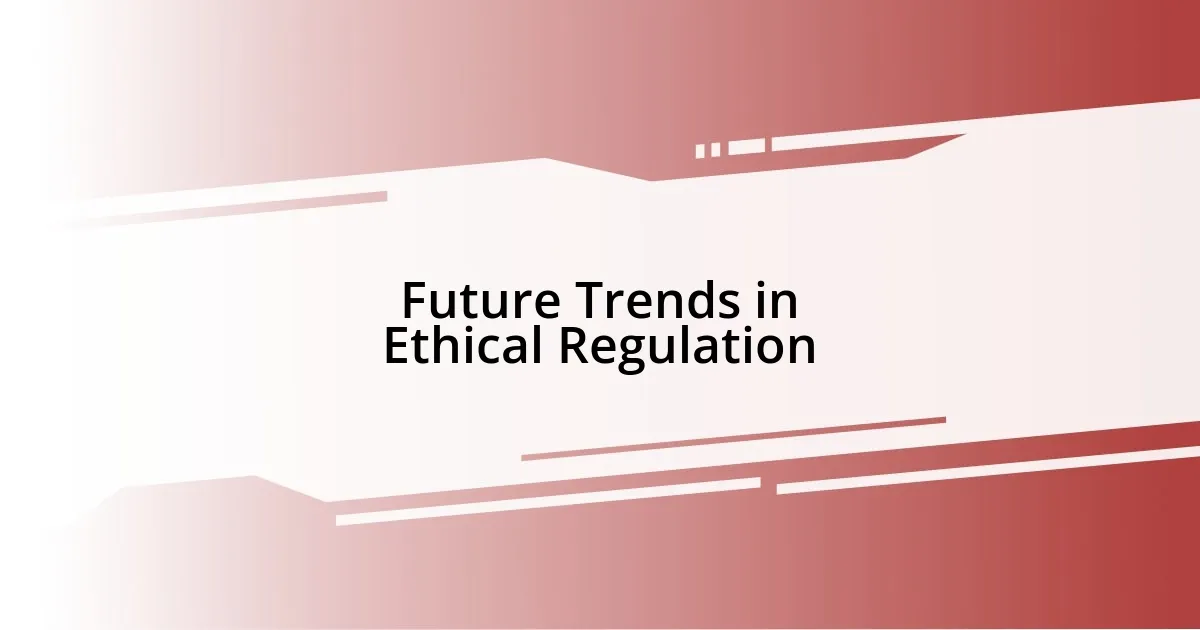
Future Trends in Ethical Regulation
As I look toward the future of ethical regulation, I believe we will see a shift towards technology-driven oversight. For instance, in a recent discussion about integrating AI into compliance processes, I was struck by how data analytics could reveal patterns that human oversight might miss. This feels like a game-changer—could it be that algorithms will enhance our ability to adhere to ethical standards in ways we haven’t yet imagined?
Another likely trend is the increasing emphasis on global collaboration in ethical standards. During a recent international conference, I realized how differing cultural perceptions of ethics often complicate regulatory frameworks. Imagine if we could harmonize these diverse views—what could that mean for multinational organizations? It’s this cross-cultural dialogue that could lead to a more comprehensive understanding of ethics on a global scale.
Moreover, I anticipate a rise in public accountability concerning organizations’ ethical practices. I remember the stir caused by a viral story about a company’s unethical behavior that led to a massive public outcry. It dawned on me that consumers increasingly demand transparency and ethical accountability. How much longer can companies ignore this shift? The pressure from informed consumers will likely drive businesses to establish more robust ethical guidelines and, ultimately, create a more ethical marketplace.












